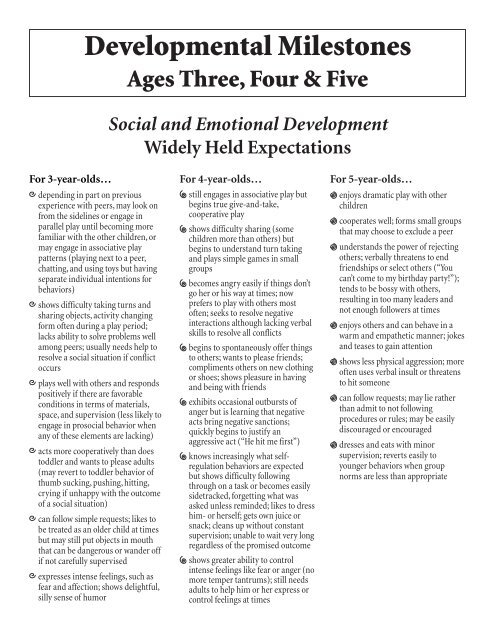Developmental Milestones Ages Three, Four & Five Language
Developmental Milestones Ages Three, Four & Five Language
Developmental Milestones Ages Three, Four & Five Language
Create successful ePaper yourself
Turn your PDF publications into a flip-book with our unique Google optimized e-Paper software.
For 3-year-olds…<br />
<strong>Developmental</strong> <strong>Milestones</strong><br />
<strong>Ages</strong> <strong>Three</strong>, <strong>Four</strong> & <strong>Five</strong><br />
+ depending in part on previous<br />
experience with peers, may look on<br />
from the sidelines or engage in<br />
parallel play until becoming more<br />
familiar with the other children, or<br />
may engage in associative play<br />
patterns (playing next to a peer,<br />
chatting, and using toys but having<br />
separate individual intentions for<br />
behaviors)<br />
+ shows difficulty taking turns and<br />
sharing objects, activity changing<br />
form often during a play period;<br />
lacks ability to solve problems well<br />
among peers; usually needs help to<br />
resolve a social situation if conflict<br />
occurs<br />
+ plays well with others and responds<br />
positively if there are favorable<br />
conditions in terms of materials,<br />
space, and supervision (less likely to<br />
engage in prosocial behavior when<br />
any of these elements are lacking)<br />
+ acts more cooperatively than does<br />
toddler and wants to please adults<br />
(may revert to toddler behavior of<br />
thumb sucking, pushing, hitting,<br />
crying if unhappy with the outcome<br />
of a social situation)<br />
+ can follow simple requests; likes to<br />
be treated as an older child at times<br />
but may still put objects in mouth<br />
that can be dangerous or wander off<br />
if not carefully supervised<br />
+ expresses intense feelings, such as<br />
fear and affection; shows delightful,<br />
silly sense of humor<br />
Social and Emotional Development<br />
Widely Held Expectations<br />
For 4-year-olds…<br />
{ still engages in associative play but<br />
begins true give-and-take,<br />
cooperative play<br />
{ shows difficulty sharing (some<br />
children more than others) but<br />
begins to understand turn taking<br />
and plays simple games in small<br />
groups<br />
{ becomes angry easily if things don’t<br />
go her or his way at times; now<br />
prefers to play with others most<br />
often; seeks to resolve negative<br />
interactions although lacking verbal<br />
skills to resolve all conflicts<br />
{ begins to spontaneously offer things<br />
to others; wants to please friends;<br />
compliments others on new clothing<br />
or shoes; shows pleasure in having<br />
and being with friends<br />
{ exhibits occasional outbursts of<br />
anger but is learning that negative<br />
acts bring negative sanctions;<br />
quickly begins to justify an<br />
aggressive act (“He hit me first”)<br />
{ knows increasingly what selfregulation<br />
behaviors are expected<br />
but shows difficulty following<br />
through on a task or becomes easily<br />
sidetracked, forgetting what was<br />
asked unless reminded; likes to dress<br />
him- or herself; gets own juice or<br />
snack; cleans up without constant<br />
supervision; unable to wait very long<br />
regardless of the promised outcome<br />
{ shows greater ability to control<br />
intense feelings like fear or anger (no<br />
more temper tantrums); still needs<br />
adults to help him or her express or<br />
control feelings at times<br />
For 5-year-olds…<br />
i enjoys dramatic play with other<br />
children<br />
i cooperates well; forms small groups<br />
that may choose to exclude a peer<br />
i understands the power of rejecting<br />
others; verbally threatens to end<br />
friendships or select others (“You<br />
can’t come to my birthday party!”);<br />
tends to be bossy with others,<br />
resulting in too many leaders and<br />
not enough followers at times<br />
i enjoys others and can behave in a<br />
warm and empathetic manner; jokes<br />
and teases to gain attention<br />
i shows less physical aggression; more<br />
often uses verbal insult or threatens<br />
to hit someone<br />
i can follow requests; may lie rather<br />
than admit to not following<br />
procedures or rules; may be easily<br />
discouraged or encouraged<br />
i dresses and eats with minor<br />
supervision; reverts easily to<br />
younger behaviors when group<br />
norms are less than appropriate


